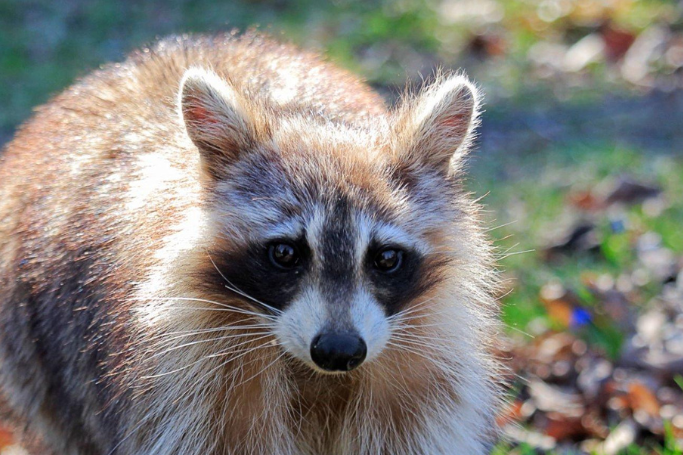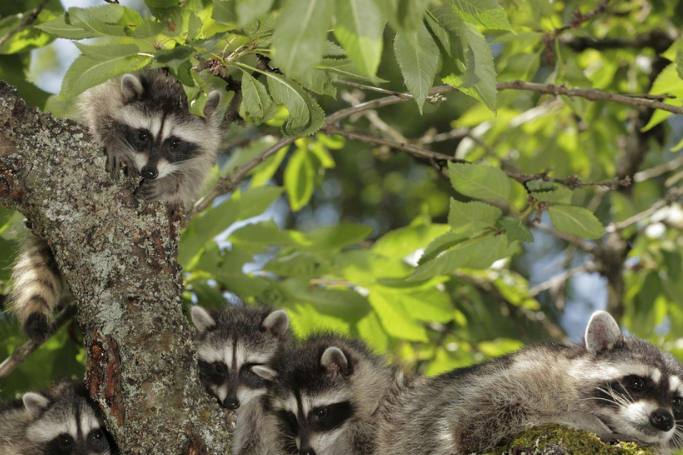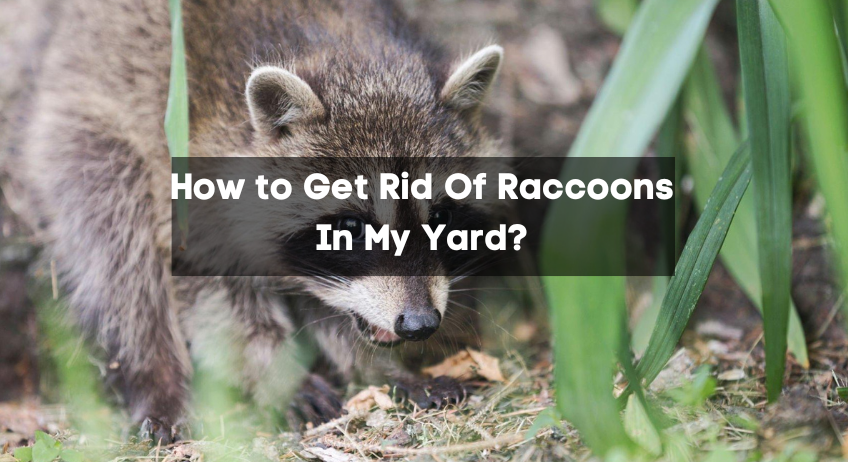Are you tired of being kept awake at night by the sound of raccoons rummaging through your trash cans? Had enough of finding your beautifully landscaped garden reduced to a barren wasteland? Fear not, because we’ve got the solution to your raccoon woes!
Say goodbye to these masked bandits and hello to a peaceful and pristine yard with our ultimate guide on how to get rid of raccoons in your yard.
Raccoons and Their Habits
Raccoons are highly adaptable animals that are native to North America.
They are omnivores and feed on a wide range of food sources, including fruits, vegetables, insects, small mammals, and human-made foods like pet food and garbage.
- Raccoons are nocturnal animals, meaning they are most active at night.
- They are omnivores and will eat almost anything, including fruits, vegetables, insects, small mammals, and even garbage.
- Raccoons are excellent climbers and can easily access rooftops, attics, and chimneys.
- They are known for their intelligence and problem-solving skills, which can make them difficult to deter or trap.
- Raccoons are also known carriers of diseases such as rabies, which can be transmitted to humans and pets.
- They are highly adaptable and can live in various habitats, including urban and suburban areas.
- Raccoons often den in hollow trees, rock crevices, and other sheltered areas but will also make dens in attics and chimneys.
Common Reasons for Raccoons to Invade Your Yard
Raccoons are curious and opportunistic animals, which means they can easily find their way into your yard if they see a food source or a comfortable place to live.
Here are some common reasons why raccoons might be invading your yard:
- Access to food: If you have a bird feeder, pet food or a garbage can that’s not securely stored, raccoons will likely find it and make themselves home.
- Water source: Raccoons need water to survive, so if you have a pond, fountain or any other water source in your yard, it can attract them.
- Shelter: Raccoons are nocturnal animals, always looking for a place to sleep during the day. If you have a shed, barn or any other structure in your yard that provides shelter, raccoons might use it.
- Attracted by lights: Having bright lights in your yard can attract raccoons and other wildlife to your property.
It’s essential to remember these common reasons when trying to get rid of raccoons from your yard. Removing the attractants can make your yard less appealing to these furry invaders.
Working Ways to get rid of raccoons in yard
If you’re looking to get rid of raccoons in your yard, there are several effective methods to consider.
Here are some of the most common and effective ways to keep raccoons out of your yard:
Secure trash cans
Ensure your cans have tight-fitting lids to prevent raccoons from accessing them.
Remove food sources
Remove any food sources attracting raccoons to your yard, such as pet food, bird feeders, and fallen fruit.
Install lights and noisemakers
Raccoons don’t like bright lights or loud noises. Installing motion-activated lights and setting up noisemakers can help deter them from your yard.
Use deterrents
Certain smells like vinegar and ammonia can help keep raccoons away. You can also try using commercial raccoon repellents.
Fence off gardens and compost bins
Raccoons love to dig in gardens and compost bins. Fencing off these areas can help prevent them from getting in.
Hire a professional
If the raccoons in your yard are persistent, consider hiring a wildlife control professional to trap and remove them humanely.
Prevention Measures to Keep Raccoons Out
Raccoons are curious and opportunistic animals, which means they can easily find their way into your yard if they see a food source or a comfortable place to live.
Here are some common reasons why raccoons might be invading your yard:
- Access to food: If you have a bird feeder, pet food or a garbage can that’s not securely stored, raccoons will likely find it and make themselves home.
- Water source: Raccoons need water to survive, so if you have a pond, fountain or any other water source in your yard, it can attract them.
- Shelter: Raccoons are nocturnal animals, always looking for a place to sleep during the day. If you have a shed, barn or any other structure in your yard that provides shelter, raccoons might use it.
- Attracted by lights: Having bright lights in your yard can attract raccoons and other wildlife to your property.

Legal Considerations When Removing Raccoons
When removing raccoons from your yard, there are several legal considerations to keep in mind. In many areas, raccoons are protected by law and may not be killed or captured without a permit.
It’s essential to familiarize yourself with the local regulations in your area to ensure that you’re taking the proper steps to remove raccoons from your yard safely and legally.
Understanding Local Wildlife Regulations
Understanding local wildlife regulations is crucial when dealing with raccoons in your yard. Different regions have different laws and regulations regarding wildlife management, including raccoons.
To ensure that you are handling the situation legally and responsibly, it is essential to familiarize yourself with the local laws and regulations.
Seeking Professional Help from Wildlife Control Experts
Professional help from wildlife control experts is an effective solution for people facing wildlife problems on their property.
These experts are well-equipped and trained to handle any wildlife issue, whether a raccoon in the attic, a squirrel in the walls, or a skunk under the porch. They use safe and humane methods to remove wildlife and prevent them from returning.
In addition, wildlife control experts are knowledgeable about local and state wildlife laws and regulations and ensure that their services comply with these laws. This eliminates the risk of penalties or legal consequences for homeowners.
Working Ways to Relocate Raccoons
Relocating raccoons can be complex, but it’s necessary to prevent them from causing damage to property and potential health hazards. Here are some practical ways to relocate raccoons:
Relocating raccoons can be complex, but it’s necessary to prevent them from causing damage to property and potential health hazards. Here are some practical ways to relocate raccoons:
- Live Trapping: This is a standard method used by wildlife control experts. Live traps are placed near the raccoons’ den, and once trapped, the raccoons are safely transported to a remote location far from the property.
- Exclusion: This method involves sealing all entry points to the raccoon’s den and removing any attractants, such as food sources. This will encourage the raccoons to find a new home elsewhere.
- Hazing: Hazing involves using loud noises, bright lights, and water to scare raccoons away from the property. This method is only effective if there are no young raccoons present, as it can cause harm to them.
- Relocation: Relocating raccoons to a remote location far from the property is another effective way to get rid of them. However, it’s essential to ensure that the new location is suitable for raccoons and not already inhabited by other wildlife.
Live Trapping and Relocation
Live trapping and relocation are popular methods for controlling wildlife populations, including raccoons, squirrels, skunks, and other species.
This method involves capturing the animals using live traps and relocating them to a remote location far from the property.
Deterrents and Repellents
Deterrents and repellents are methods used to prevent wildlife, such as raccoons, squirrels, and skunks, from accessing a property and causing damage.
These methods are designed to discourage animals from coming near the property without causing harm to the animals.
Physical Deterrents
Physical deterrents, such as fences, barriers, and mesh screens, prevent animals from accessing the property by creating a physical barrier.
These methods are effective for keeping animals away from specific areas, such as gardens and trash cans.
Chemical Repellents
Chemical repellents use strong-smelling substances, such as ammonia and vinegar, to discourage animals from coming near the property.
These substances are safe for humans and pets, but they can be unpleasant for animals, and they may move to a different location in search of a better environment.
Sonic Repellents
Sonic repellents emit high-frequency sounds unpleasant to wildlife but inaudible to humans and pets.
These devices can be placed near the property or in specific areas, such as gardens or trash cans, to keep animals away.
Visual Deterrents
Visual deterrents, such as motion-activated lights and scarecrows, can effectively deter wildlife by creating an intimidating or unpredictable environment.

Common Mistakes to Avoid When Dealing with Raccoons
Dealing with raccoons can be challenging, and it’s essential to avoid common mistakes that can make the situation worse.
Here are some errors to avoid when dealing with raccoons:
- Using Poison: Using poison to kill raccoons is illegal in many states and inhumane. Poison can cause a slow and painful death for the raccoons and pose a risk to other wildlife and pets that may consume the poisoned raccoons.
- Ignoring Young Raccoons: Young raccoons that have been orphaned need special care and attention. Skipping them can lead to malnutrition, dehydration, and even death. It’s essential to seek professional help from wildlife control experts if young raccoons are present.
- Sealing Entrances without Removing Raccoons: Sealing the entrance to a raccoon’s den without first removing the raccoons can be dangerous and inhumane. The raccoons can become trapped inside and suffer dehydration, starvation, and suffocation.
- Relocating Raccoons Improperly: Relocating raccoons to a location unsuitable for their survival, such as an urban area, can be harmful to the raccoons and the environment. It’s important to follow local and state wildlife laws and regulations and to seek professional help from wildlife control experts to ensure a safe and humane relocation process.
- Feeding Raccoons: Feeding raccoons can encourage them to stay near the property and create a nuisance. It’s essential to eliminate any food sources, such as open trash cans and bird feeders, to discourage raccoons from coming near the property.
3 Ways to Get Rid Of Raccoons Fast
Importance of Proper Raccoon Handling
Handling raccoons can be a delicate task, and it’s crucial to do so in a way that keeps both humans and raccoons safe.
From carrying diseases like rabies to causing damage to your property, these curious creatures require proper handling to avoid potential harm.
Here are some key reasons why proper raccoon handling is essential:
Disease Prevention
Raccoons are known carriers of diseases like rabies and leptospirosis that can be transmitted to humans and pets.
By wearing protective gear and using safe capture methods during raccoon handling, you can help prevent the spread of these diseases.
Humane Treatment
Raccoons are wild animals, and it’s our responsibility to ensure they are treated with respect and care.
Harsh or inhumane handling, such as killing or injuring animals, goes against our moral code and can cause unnecessary suffering.
Proper raccoon handling, including safe capture and relocation methods, ensures the well-being of these fascinating creatures.
Environmental Stewardship
Relocating raccoons to areas where they are not native or to urban environments can cause harm to the animals and the environment.
By following local and state wildlife laws and regulations and seeking professional help from wildlife control experts, you can ensure a safe and sustainable relocation process that protects both raccoons and their new environment.
Health Concerns and Safety Precautions
When dealing with raccoons, it’s essential to consider their health and your own. Here are some key health concerns and safety precautions to keep in mind:
- Disease Transmission: Raccoons can carry diseases such as rabies and leptospirosis that can be transmitted to humans and pets. To reduce the risk of disease transmission, it’s essential to wear protective gear and use safe capture methods when handling raccoons.
- Bites and Scratches: Raccoons have sharp claws and teeth and can bite or scratch if they feel threatened. To avoid bites and scratches, it’s essential to avoid direct contact with raccoons and to use caution when handling them.
- Zoonotic Diseases: Some diseases that raccoons carry, such as roundworm, can also infect humans. Good hygiene practices, such as washing your hands after handling raccoons or their waste, are essential to reduce the risk of zoonotic diseases.
- Rabies: Rabies is a severe disease transmitted through bites, scratches, or saliva from infected animals. To reduce the risk of rabies, it’s essential to avoid direct contact with raccoons and to seek medical attention if you are bitten or scratched by a raccoon.
- Safe Relocation: Relocating raccoons to the wrong location can harm the raccoons and the environment. To ensure safe relocation, it’s important to follow local and state wildlife laws and regulations and to seek professional help from wildlife control experts.
Frequently Asked Questions (FAQ)
Q: How can I get rid of raccoons in my yard?
A: Here are some practical ways to get rid of raccoons in your yard:
– Remove food sources such as garbage cans, pet food, and bird feeders.
– Seal off access to den sites, such as chimneys, attics, and underdecks.
– Use deterrents such as lights, loud noises, and sprays with unpleasant scents.
– Hire a professional wildlife control expert to trap and relocate the raccoons humanely.
Q: What type of deterrents can I use to keep raccoons away?
A: Deterrents to keep raccoons away include lights, loud noises, and sprays with unpleasant scents.
Q: Is it illegal to harm raccoons?
A: In most places, it is illegal to harm raccoons without a permit from wildlife authorities. It is recommended to use humane methods to deal with raccoon problems.
Q: Can raccoons carry diseases?
A: Yes, raccoons can carry diseases like rabies and leptospirosis that can be transmitted to humans and pets.
Q: How can I prevent raccoons from accessing my trash cans?
A: To prevent raccoons from accessing your trash cans, secure the lid with bungee cords or a heavy object, and place the cans in a location that raccoons cannot reach, such as a garage or shed.
Q: Can I relocate raccoons on my own?
A: While it is possible to relocate raccoons on your own, it is recommended to seek help from a professional wildlife control expert. This ensures a safe and humane relocation process and prevents further problems.
Q: Can raccoons cause damage to my home?
A: Yes, raccoons can cause damage to homes by accessing attics, chimneys, and other areas to build dens. They can also damage gardens and lawns in search of food.
Q: Is it possible to humanely remove a family of raccoons from my yard?
A: Yes, it is possible to humanely remove a family of raccoons from your yard by using live traps and relocating them to a suitable location with the help of a professional wildlife control expert.
Q: Are raccoons active during the day?
A: Raccoons are primarily nocturnal animals, but they may be active during the day in some cases, such as when they are raising young or if they are habituated to human presence.
Q: Can I use poison to get rid of raccoons?
A: No, it is illegal and inhumane to use poison to get rid of raccoons. Instead, use humane methods such as deterrents, exclusion, and live trapping with professional help.
Q: What should I do if I find a baby raccoon alone?
A: If you find a baby raccoon alone, it is best to leave it alone and observe from a safe distance. In most cases, the mother raccoon will return to care for her young. If the baby raccoon appears injured or in danger, seek help from a local wildlife rehabilitation centre.
Q: How long do raccoons typically live?
A: Raccoons typically live 2-3 years in the wild and up to 10 years in captivity.
Final Word
In conclusion, removing raccoons in your yard requires eliminating food sources, sealing off access to den sites, using deterrents, and hiring a professional wildlife control expert to trap and relocate the raccoons humanely. Following legal and humane methods to resolve raccoon problems in your yard is essential.

